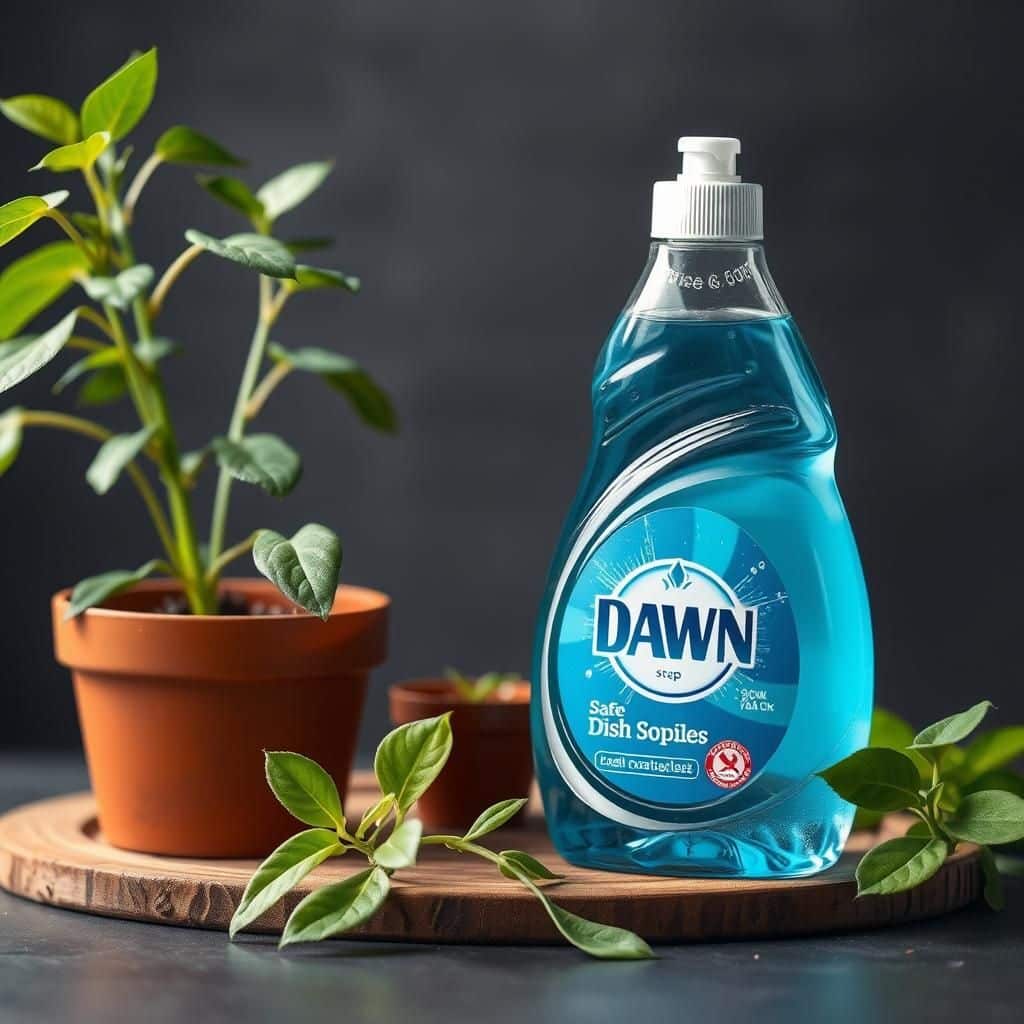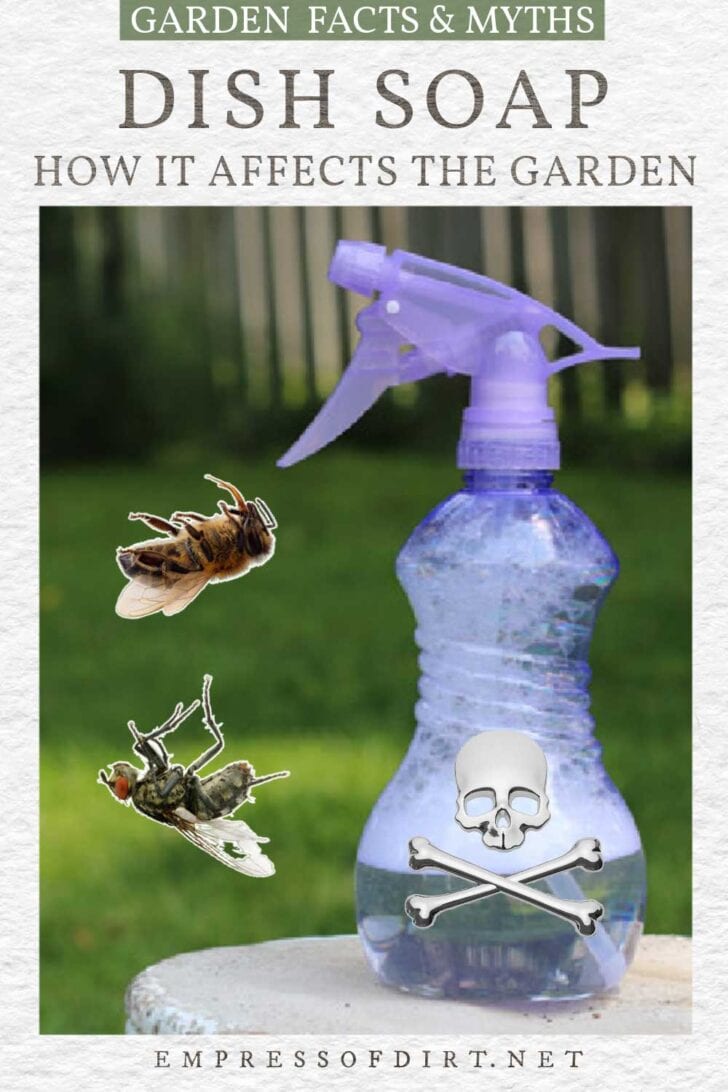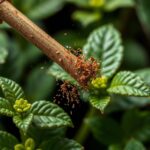Is Dawn Dish Soap Safe for Plants? Understanding the Risks and Benefits

When it comes to gardening and plant care, many enthusiasts seek effective solutions for pest control and cleaning. One common household item that often comes up in this context is Dawn dish soap. While it is known for its grease-fighting properties, questions arise about its safety for plants. This article explores the potential risks and benefits of using Dawn dish soap in your gardening routine. By examining its effects on different plant types and evaluating its efficacy against pests, we aim to provide a comprehensive understanding to help you make informed decisions for your garden.
Is Dawn Dish Soap Safe for Plants?
Using Dawn dish soap on plants can be a topic of debate among gardeners. While Dawn is known for its effectiveness in cutting grease and cleaning dishes, it is also used as an insecticide to manage pests on plants. When diluted properly, it is generally considered safe for plants, as it can help eliminate harmful insects such as aphids and mites without causing significant harm. However, it is essential to use it sparingly and in appropriate concentrations to avoid any potential damage to the foliage or roots. Always test on a small portion of the plant before applying it widely to ensure that it can tolerate the solution.
Benefits of Using Dawn Dish Soap on Plants
One significant benefit of using Dawn dish soap in the garden is its ability to act as a natural insecticide. The soap works by suffocating insects like aphids and spider mites when sprayed directly on them, disrupting their membranes. This non-toxic approach makes it safer for beneficial insects compared to chemical pesticides. Additionally, using Dawn can also help with fungal diseases by clearing away debris and promoting healthier airflow around plants.
How to Dilute Dawn Dish Soap for Plants
To safely use Dawn dish soap on your plants, it's crucial to dilute it properly. A common ratio is approximately one tablespoon of Dawn per gallon of water. This dilution helps to minimize any potential damage to the plant while still retaining its pest-control effectiveness. Always mix the solution well before application, and consider pouring some into a spray bottle for easier application over the targeted areas.
Precautions When Using Dawn Dish Soap
While Dawn dish soap can be beneficial, certain precautions should be considered. Avoid using it on young plants or during hot sunny weather, as this can increase the risk of leaf burn. Additionally, refrain from using the soap more than once a week to prevent any adverse effects on plant health. Always closely monitor your plants for any signs of distress after application.
Alternatives to Dawn Dish Soap
If you're concerned about using Dawn dish soap, there are several natural alternatives available. Options like neem oil, insecticidal soap, or even a mixture of water with baking soda and soap can be effective in managing pests without the potential risks associated with dish soap. Each alternative has its own benefits and can be tailored to meet the needs of different plants and pest issues.
Testing for Plant Sensitivity
Before applying Dawn dish soap extensively, it's advisable to conduct a simple test for plant sensitivity. Apply the diluted solution to a small area of the plant and wait 24 hours to observe any adverse reactions. If the plant shows no signs of distress, such as wilting or discoloration, it is likely safe to use on the rest of the plant. However, monitoring any plant after treatment is crucial in understanding how they react to different soaps and solutions.
| Aspect | Dawn Dish Soap | Alternatives |
|---|---|---|
| Effectiveness against Pests | Good | Varies by product |
| Risk of Plant Damage | Moderate (if misused) | Low (often safer) |
| Cost | Low | Varies |
| Ease of Use | Simple | Depends on the product |
| Environmental Impact | Moderate | Lower (often organic) |
What dish soaps are safe for plants?

When it comes to keeping plants healthy and pest-free, using the right type of dish soap can be crucial. Some dish soaps contain harsh chemicals that may be harmful to plants, while others are formulated with gentler ingredients that can be safe for both plants and the environment. Here are a few dish soaps that are generally considered safe for use on plants:
1. Castile Soap: This is a vegetable-based soap that is biodegradable and free from synthetic additives. It is effective in controlling pests and can be diluted with water for safe application on many types of plants.
2. Dr. Bronner’s Pure-Castile Soap: This soap is organic and made from natural ingredients. It is gentle enough for plants and can be used as an insecticidal soap when mixed with water at specific ratios.
3. Dawn Ultra: This dish soap is often used by gardeners as a pesticide when diluted properly. It is important to use it in small amounts to prevent any potential harm to the plants.
See also:
4. Seventh Generation Dish Soap: Known for its eco-friendly formulation, this soap uses plant-based ingredients and is free from dyes and synthetic fragrances, making it safer for use on houseplants and garden plants.
5. Baby Shampoo: While not a traditional dish soap, mild baby shampoo can also be effective as a pesticide and is generally gentle enough for plant use when diluted with water.
Benefits of Using Safe Dish Soap on Plants
Using safe dish soaps can provide numerous benefits for your plants.
- Pest Control: Mild soaps can help in managing aphids, spider mites, and other pests effectively.
- Fungal Treatment: Some soaps can assist in managing fungal diseases by disrupting the life cycle of the fungi.
- Environmentally Friendly: Using biodegradable soaps reduces harmful impacts on local ecosystems.
How to Use Dish Soap Safely on Plants
Applying dish soap to your plants requires careful consideration to avoid damaging them.
- Dilution: Always dilute the dish soap with water before application, usually 1-2 tablespoons of soap per gallon of water.
- Patch Testing: Before widespread application, test on a small, inconspicuous area of the plant.
- Timing: Apply during cooler parts of the day to prevent leaf burn from the sun.
Common Mistakes to Avoid When Using Dish Soap
Even safe dish soaps can lead to issues if not used correctly.
- Using Too Much Soap: Excess soap can lead to build-up on leaves and may suffocate the plants.
- Neglecting to Rinse: Failing to rinse soap residue off can result in leaf burn or attract pests.
- Ignoring Plant Sensitivity: Some plants are more sensitive than others; always consider the specific needs of your plant.
Effectiveness of Different Types of Dish Soaps
Different dish soaps offer varying levels of effectiveness in pest control and plant health.
- Biodegradable Soaps: Generally more effective for eco-friendly gardening due to their natural composition.
- Specialty Formulations: Some brands specifically formulate their products for gardening, enhancing effectiveness.
- Basic Formulas: Traditional dish soaps may work but can contain additives that aren't plant-safe.
Alternatives to Dish Soap for Plant Care
If you're not comfortable using dish soap, there are alternatives to consider.
- Neem Oil: A natural pesticide effective against various pests.
- Insecticidal Soap: Specifically designed for pests, these soaps are usually more effective than regular dish soaps.
- Essential Oils: Oils like peppermint and tea tree have pest-repellent properties that can protect plants.
Can Dawn dish soap water be used to water plants?

Using Dawn dish soap water to water plants can be a topic of both interest and caution. While Dawn is known for its ability to effectively cut grease and grime, it is essential to understand the implications of using such products in gardening.
Understanding Dish Soap and Its Composition
Dawn dish soap contains various surfactants and chemicals designed to aid in cleaning without leaving residue. While these components are safe for dishwashing, their effects on plants can vary. When using dish soap in gardening, consider the following aspects:
- Plant Sensitivity: Different plants react uniquely to soap exposure. Some may tolerate mild solutions, while others could suffer from damage.
- Concentration Levels: A diluted mixture is often safer for plants than undiluted soap, as high concentrations might cause leaf burn or hinder growth.
- Environmental Impact: Chemicals in commercial soaps may affect soil health and local ecosystems negatively over time.
Potential Benefits of Using Dawn Dish Soap Water
When used in moderation, Dawn dish soap water can offer some benefits for plant care:
- Pest Control: The surfactants can help to suffocate pests like aphids and spider mites, aiding in organic pest management.
- Cleaning Leaves: A diluted soap solution can remove dust and debris from leaves, improving photosynthesis.
- Enhanced Water Absorption: Soap can reduce water surface tension, potentially allowing better absorption of water by the soil.
Risks Associated with Using Dawn Dish Soap Water
Despite some potential benefits, there are significant risks to be aware of:
See also:
- Phytotoxicity: Overuse can lead to toxic reactions in plants, showcasing symptoms like wilting or browning leaves.
- Soil Microbiome Disruption: The introduction of dish soap may harm beneficial microbes in the soil, disrupting nutrient absorption.
- Long-term Effects: Repeated use could result in accumulating harmful elements in the soil, affecting its health and productivity.
How to Use Dawn Dish Soap Water Safely
If you decide to use Dawn dish soap water on your plants, follow these guidelines to minimize risks:
- Dilution: Mix one teaspoon of Dawn in a gallon of water to create a safe solution for watering.
- Test on Small Areas: Apply the solution on a small section of your plant first to check for adverse reactions.
- Frequency: Use sparingly, aiming for no more than once a month to avoid any negative impact on plant health.
Alternatives to Dawn Dish Soap for Plant Care
If you're concerned about using Dawn, there are alternative products and methods for plant care:
- Natural Insecticidal Soaps: These are specifically formulated for horticultural use and are less likely to harm plants.
- Neem Oil: A natural pesticide that effectively targets pests while being safe for plants when used correctly.
- Homemade Soaps: Create a mild soap mixture from natural ingredients such as castile soap, which can be safer for plants.
What plants are sensitive to dish soap?

Many plants can be sensitive to dish soap, especially those that have delicate leaves or are prone to leaf burn. Generally, dish soaps contain surfactants and other chemicals that can be harmful to certain plant species. Here are some examples of plants particularly sensitive to dish soap:
1. Ferns: These plants often have delicate fronds that can be damaged by the harsh components in dish soap.
2. Orchids: With their tender blooms and unique foliage, orchids can suffer from leaf burn and root damage if exposed to dish soap.
3. Succulents: Many succulents have sensitive epidermises and can be affected by the residue left from dish soap, leading to rot or discoloration.
4. Carnivorous plants: These plants, which have evolved to thrive in nutrient-poor environments, may be harmed by the additives found in standard dish soaps.
5. Cacti: While more resilient than many other plants, cacti can still be subject to damage from dish soap if not diluted properly.
Factors Affecting Sensitivity to Dish Soap
The sensitivity of plants to dish soap can depend on several factors, which can vary between different species. Key factors include:
- Concentration: High concentrations of dish soap can be more damaging than diluted solutions.
- Type of Soap: Some brands contain harsh chemicals that may harm plants more than others.
- Environmental Conditions: Humidity levels, temperature, and light can all influence how plants react to dish soap.
Signs of Sensitivity in Plants
When plants are exposed to dish soap, there are common symptoms that can indicate sensitivity. Recognizing these early can help in addressing any damage:
- Leaf Burn: This can manifest as browning or crispy edges on leaves.
- Wilting: Affected plants may show signs of wilting despite adequate watering.
- Discoloration: Yellowing or bleaching of leaves can occur when dish soap is used improperly.
Alternatives to Dish Soap for Plant Care
For those concerned about the adverse effects of dish soap on sensitive plants, there are several alternatives that can be used safely:
- Insecticidal Soap: Formulated specifically for plants, this is less likely to cause damage.
- Neem Oil: A natural pesticide that can be safe for many plant types.
- Water: Simply rinsing plants with water can often help control pests without the risks associated with soaps.
Best Practices for Using Dish Soap on Plants
If dish soap must be used, following best practices can mitigate potential damage:
- Dilution: Always dilute dish soap in water before applying to plants.
- Patch Test: Test a small area of the plant before full application.
- Timing: Apply during cooler parts of the day to reduce the risk of leaf burn.
Common Myths about Dish Soap and Plants
There are misconceptions surrounding the use of dish soap on plants that can lead to improper care:
- All soaps are equal: Not all dish soaps are safe for plants; chemical compositions vary.
- More is better: Using large amounts of soap can cause more harm than good.
- Immediate effectiveness: Instant results may lead to overuse, causing plant damage over time.
Questions from Our Readers
Is Dawn dish soap safe for plants?
Yes, Dawn dish soap can be safe for plants when used in moderation and diluted properly. It is commonly used as an insecticidal soap to help control pests without harming the plants, but it’s important to ensure that it’s well-diluted to avoid any potential damage.
How should I dilute Dawn dish soap for use on plants?
To safely use Dawn dish soap on plants, mix approximately 1 to 2 tablespoons of soap with a quart of water. This dilution ensures that the solution is effective against pests while minimizing the risk of harming your plants.
See also:
Can using Dawn dish soap harm my plants?
While Dawn dish soap is generally safe, overuse or high concentrations can lead to leaf burn or other damage. Always conduct a patch test on a small part of the plant first to check for any adverse reactions before applying it more widely.
How often can I use Dawn dish soap on my plants?
It is advisable to use a Dawn dish soap solution no more than once a week, allowing your plants time to recover from any treatment. Frequent applications may increase the risk of stress or damage to the plant.

If you want to read more articles like Is Dawn Dish Soap Safe for Plants? Understanding the Risks and Benefits, we recommend you check out our Plants category.
Leave a Reply
Related Articles